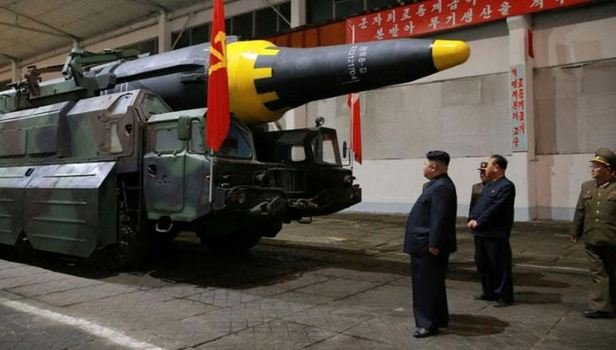North Korea missile detected by THAAD, programme progressing faster than expected - South Korea
18 May 2017 ( IBTN News Bureau )
North Korea's missile programme is progressing faster than expected, South Korea's defence minister said on Tuesday, after the U.N. Security Council demanded the North halt all nuclear and ballistic missile tests and condemned Sunday's test-launch.
Han Min-koo told South Korea's parliament the test-launch had been detected by the controversial U.S. THAAD anti-missile system, whose deployment in the South has infuriated China.The reclusive North, which has defied all calls to rein in its weapons programmes, even from its lone major ally, China, said the missile test was a legitimate defence against U.S. hostility.
The North has been working on a missile, mounted with a nuclear warhead, capable of striking the U.S. mainland. U.S. President Donald Trump's administration has called for an immediate halt to Pyongyang's provocations and has warned that the "era of strategic patience" with North Korea is over.
U.S. Disarmament Ambassador Robert Wood said on Tuesday China's leverage was key and it could do more. Han said Sunday's test-launch was "successful in flight". "It is considered an IRBM (intermediate range ballistic missile) of enhanced calibre compared to Musudan missiles that have continually failed," he said, referring to a class of missile designed to travel up to 3,000 to 4,000 km (1,860 to 2,485 miles).
Asked if North Korea's missile programme was developing faster than the South had expected, he said: "Yes." Han said the Terminal High Altitude Area Defense (THAAD) anti-missile unit deployed by the U.S. military in the South detected the North Korean missile, marking the first time the controversial system has been put to use since its deployment last month.
China has strongly opposed THAAD, whose radar it fears could be used to spy into its territory, despite assurances from Washington that THAAD is purely defensive. South Korean companies, from automakers to retailers and cosmetics firms, have been hit in China by a nationalist backlash over Seoul's decision to deploy the system.
The North's KCNA news agency said Sunday's launch tested its capability to carry a "large-size heavy nuclear warhead". Its ambassador to China said in Beijing on Monday it would continue such test launches "any time, any place".
The test-launch was a legitimate act of self-defence and U.S. criticism was a "wanton violation of the sovereignty and dignity of the DPRK", a North Korean diplomat told the U.N. Conference on Disarmament in Geneva on Tuesday.
DPRK are the initials of North Korea's official name, the Democratic People's Republic of Korea. "The DPRK will bolster its self-defence capabilities as long as the United States continues its hostile policies towards the DPRK and imposes nuclear threats and makes blackmail," diplomat Ju Yong Choi said.
The missile flew 787 km (489 miles) on a trajectory reaching an altitude of 2,111.5 km (1,312 miles), KCNA said. Pyongyang has regularly threatened to destroy the United States, which it accuses of pushing the Korean peninsula to the brink of nuclear war by conducting recent military drills with South Korea and Japan.
Trump and new South Korean President Moon Jae-in will meet in Washington next month, with North Korea expected to be high on the agenda, the South's presidential Blue House said. Moon met Matt Pottinger, overseeing Asian affairs at the U.S. National Security Council, on Tuesday and said he hoped to continue to have "sufficient, close discussions" between Seoul and Washington, the Blue House press secretary told a briefing.
''FURTHER SANCTIONS POSSIBLE'' In a unanimous statement, the 15-member UN Security Council on Monday said it was of vital importance that North Korea show "sincere commitment to denuclearization through concrete action and stressed the importance of working to reduce tensions". "To that end, the Security Council demanded the Democratic People's Republic of Korea conduct no further nuclear and ballistic missile tests," the council said, adding that it was ready to impose further sanctions on the country.
The North's foreign ministry rejected the statement, saying it infringed on its right to self-defence, particularly as the missile was test-launched at a sharp angle to ensure safety of neighbouring countries.
The UN statement also condemned an April 28 ballistic missile launch by Pyongyang. Following that launch, Washington began talks with China on possible new U.N. sanctions. Traditionally, the United States and China have negotiated new measures before involving remaining council members.
(Click here for Android APP of IBTN. You can follow us on facebook and Twitter)
Share This News
About sharing
-
 14 Feb 2026
Bangladesh Elections: How did the election results and referendum turn out?
14 Feb 2026
Bangladesh Elections: How did the election results and referendum turn out?
Bangladesh Elections: How did the election results and referendum turn out?
-
 03 Jan 2026
Live: Trump claims Maduro of Venezuela captured after attacks
03 Jan 2026
Live: Trump claims Maduro of Venezuela captured after attacks
Live: Trump claims Maduro of Venezuela captured after attacks
Sa...
-
 17 Nov 2025
Live: Sheikh Hasina sentenced to death, Bangladesh asks India to return her
17 Nov 2025
Live: Sheikh Hasina sentenced to death, Bangladesh asks India to return her
Live: Sheikh Hasina sentenced to death, Bangladesh asks India to return her
-
 17 Nov 2025
Interim government of Bangladesh denies trial is politically motivated
17 Nov 2025
Interim government of Bangladesh denies trial is politically motivated
Interim government of Bangladesh denies trial is politically motivated
...



